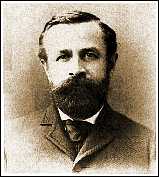A biography of Edward Bellamy (1850-1897)
 Edward Bellamy was born March 26, 1850 in Chicoppee Falls, Massachusetts. Son and grandson of Baptist ministers, Bellamy studied law and worked briefly in the newspaper industry in New York and in Springfield, Massachusetts. Although he published four novels and several essays in his lifetime, he is remembered most for his 1888 work Looking Backward, 2000-1887 and it was this novel which influenced the formation of the Nationalist political movement and several accompanying utopian living experiments during the 1890`s. The novel became so popular that by 1900 only Uncle Tom`s Cabin had sold more copies.
Edward Bellamy was born March 26, 1850 in Chicoppee Falls, Massachusetts. Son and grandson of Baptist ministers, Bellamy studied law and worked briefly in the newspaper industry in New York and in Springfield, Massachusetts. Although he published four novels and several essays in his lifetime, he is remembered most for his 1888 work Looking Backward, 2000-1887 and it was this novel which influenced the formation of the Nationalist political movement and several accompanying utopian living experiments during the 1890`s. The novel became so popular that by 1900 only Uncle Tom`s Cabin had sold more copies.
Looking Backward, certainly considered by many as within the genre of utopian fiction, anticipates a future America (the year 2000) of nationalized industry, equal distribution of wealth and the destruction of class divisions--this vision counters the problems Bellamy saw with his contemporary society. In this utopian world, loyalty to the solidarity of the state holds the society together. Bellamy called this philosophy Nationalism. Although his fictional story in Looking Backward is unique, Bellamy owes much of the philosophy behind his vision to an earlier social reformer and author, Laurence Gronlund, who published his treatise The Cooperative Commonwealth: An Exposition of Modern Socialism in 1884. Bellamy`s novel gained so much attention after it was published, Gronlund stopped the distribution of his work and endorsed Bellamy`s vision as the means to a new socialist society. The combined vision of Gronlund, Bellamy and the soon to be formed Nationalist movement helped to spark several utopian living experiments during the decade.
By late 1888, the first of the Bellamy Nationalist Clubs was formed and the movement soon spread across the country attracting such notable personalities as authors William Dean Howells and Edward Everett Hale. The main purpose of the clubs was to create and promote the practical realization of Bellamy`s utopian vision. Members became involved with other reform political groups and the Nationalists were represented at the 1891 Populist Party convention. Eugene Debs, the up and coming Socialist leader, also advocated some of Bellamy`s programs. However, the Nationalist movement stressed an evolutionary not revolutionary approach to social change. A small group of educated leaders, not masses of laborers or workers, would usher in the new society. This attitude alienated some of the more radical Socialist and Populist supporters of Nationalism. Despite temporary solidarity with these groups, the Nationalist movement lost popularity and was essentially dead by 1894.
After Looking Backward, Bellamy published one more novel, Equality, in 1897 and it met with significantly less enthusiasm. Soon after this publication Bellamy died at his childhood home in Chicopee Falls at the age of 48. Although the political movements and communal experiments associated with Bellamy`s vision were short lived, his novel remains relatively popular today and will certainly gain new attention as we approach the millennium.
